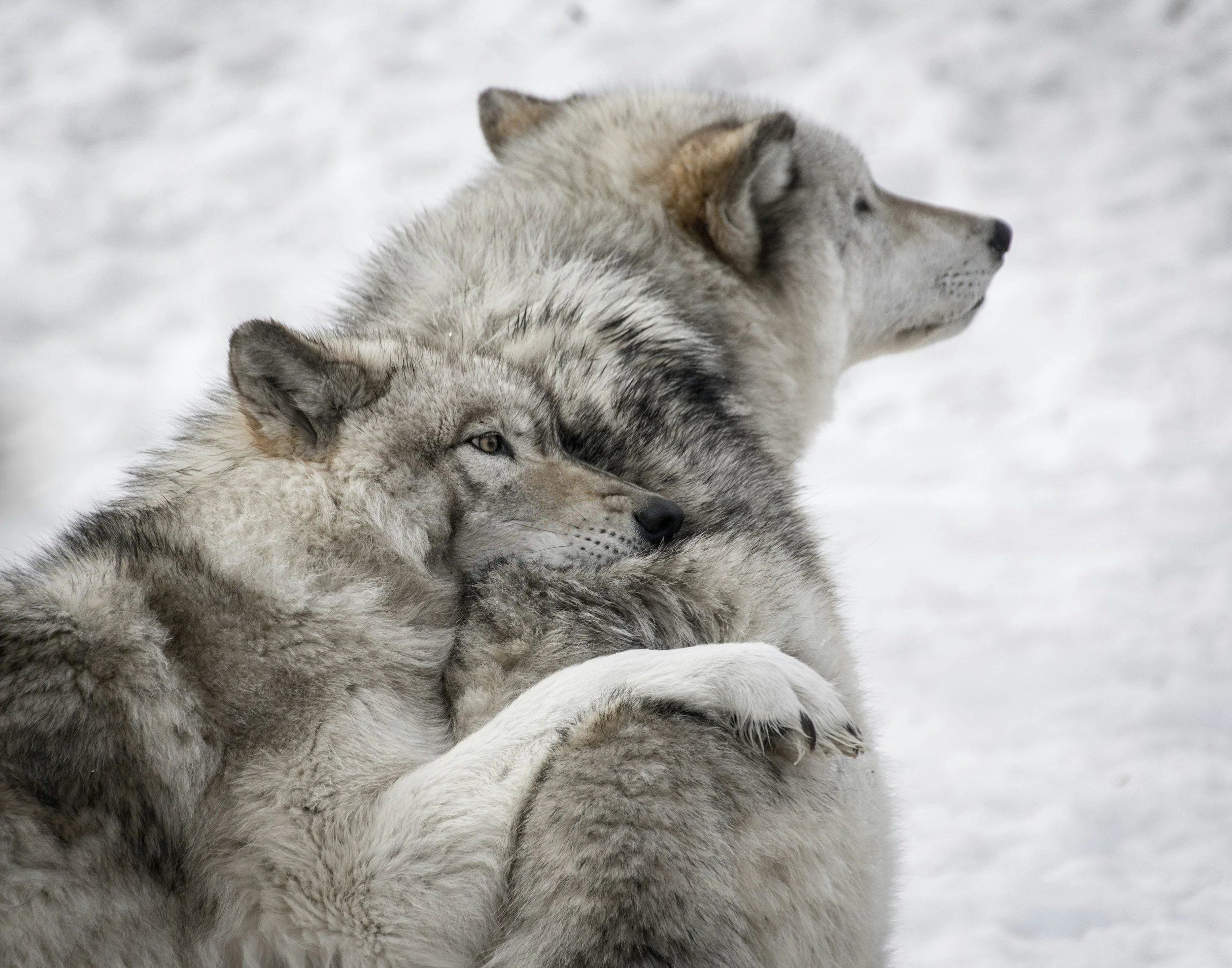Trusting the Wolf — Why Sharing My Stories Still Terrifies Me
This is Part 2 of a 3-part series. If you missed Part 1, you can read it here.
The Wolf Card from Wild Mystic Oracle by Anastasia Catris
Instinct
Last night, I drew a card and asked the question, "What do I need to know about my fear + my writing?"
I wanted to explore the reason I'm so scared when I think about my writing and sharing.
The card that came up was the Wolf - Instinct.
This card represents trusting our animal-self.
I see this as our gut, our nervous system, and our instincts. The wolf warns us against bottling up our emotions, lest we explode. It also urges us to trust ourselves in the face of those who would attempt to tie us down or overpower us.
Oof.
Immediately, I thought of the Reaper and the Love Bomber. These are figures from my past who attempted, through deception and manipulation (another warning in the card) to control how I viewed myself, my voice, and my creativity.
I’ve been writing since I was young, expressing my soul in ink. The issue was the earliest people I shared my works with were either supportive in all the right ways with a caveat—or downright dismissive.
It makes total sense that's where my instinctual sense of self-preservation comes in, especially related to my writing.
My Calling
It feels ridiculous to say that your life's calling is to write stories when the world is on fire.
I could be a politician. I could be a teacher again. I could be a therapist for the rest of my life.
I could serve in all of these different ways and be a million different versions of myself, and still my calling would be clear.
My soul came here to be an author.
And that's just it—I am an author!
I am a writer!
I have written eight books to completion and published four.
I've seen my name printed in half-a-dozen anthologies.
I've penned hundreds more stories and poems than will ever be read by others.
So I am already doing what I'm here to do… Only half in. Because I still get absolutely terrified to actually share my books with people and put them out there because they're vulnerable on multiple levels.
My instinct tells me to keep going no matter what though because there is no other choice for me.
I know it probably sounds nonsensical, but my stories are real in so many ways.
I've had people message me after reading The Wind Sings Sorrow and ask things like, "Is this a memory? Are these real people? What is this?"
There's something so visceral and concrete to my books, and I know it—because these are the stories I'm here to share. I'm meant to bring these characters to life. There is something in my soul, my purpose, tied into all of this. A spiritual weight.
Honestly—I don't even understand it myself, but I do understand why it’s complicated.
The Complexity of My First "Supporter"
My early relationship with writing was made complex because of people.
My first supporter was someone I call the Reaper in much of my writing—a father figure from my childhood who was highly manipulative. The Reaper spent over six years grooming and abusing me. At his careless hands, I experienced the kind of twisted things that when people hear about it, they have no idea how I stand on my own two feet. But I lived through my story so I can tell the tale, and so I can do what I’m actually meant to do.
What I’m meant to do is share my personal story and stories—my fantastical works that may or may not actually be fiction.
But the extra layer of complexity was that the Reaper was the first one who encouraged me to be a author in the first place.
Starting when I was around 11-years-old, I began writing a science fiction epic about a young girl who came through a wormhole when fleeing her planet. The Reaper read it and was beyond encouraging. He kept telling me, "You’re really good. One day you're gonna be the next Stephen King."
That positive reinforcement was exactly what I needed to keep going.
Yet much of the writing I was doing during that time was processing what was happening to me because of him—through characters and the lens of science fiction and seemingly unrelated things. And then once beyond the abuse, I wondered if I was actually any good.
So yeah—Growing up as a girl who was abused and threatened into silence, this reclamation of voice is deep and ongoing work.
The Chorus of Doubt
But the Reaper wasn't the only conflicting voice in my life.
My dad didn't really care about my writing—he never read anything I wrote, not once to my knowledge. My mother did read my work and was generally supportive, while simultaneously warning me that no one makes it as an author unless you're the rare exception. (Note: All the adults in my life seemed obsessed with Stephen King as the benchmark for success, but none of them addressed his reality of rejection and persistence—something I didn't discover until much later.)
Then, in one of my longer-term adult relationships with the person I call the Love Bomber, I was made to feel like my writing was only mediocre without his input. He actually worked in one of my manuscripts—set in the same universe as The Wind Sings Sorrow—which was part of why I didn’t touch that setting for so long.
For over 30 years of my life, I was told I wasn't good enough. I was told I wouldn't make it as an author. I was told I was too wordy. I was told that nobody would care about my characters because they're too different and unrelatable.
But all authors got somewhere through persistence and through believing in their dream, not simply by writing in a vacuum.
I have a truth about storytelling and a voice that lives in my bones. I've always valued it. I've always known it was my path.
But I've spent decades trying to untangle my complex history and figure out how to stand in that knowing while carrying the weight of everyone who said I couldn't.
I just won’t give up. I truly believe, despite all the doubt, that I am MEANT to be a writer.
Stories as Processing, Stories as Medicine
I explore deep spiritual themes in my fiction.
I explore aspects of myself, my larger view of the cosmos, and wisdom downloads through my characters.
This means that when I write, I'm excavating some core truth beneath it all.
Take my Ter'Ahn's Chosen series, for example. It deals with challenging topics like slavery, genocide, war and weapons systems, the loss of humanity and also the absolute heart of humanity—the love, the fierce protection we offer to our loved ones, the experiences of loss, grief, rage, and terror.
Media helps us confront things we might never be willing to confront otherwise. My books are human explorations that tackle things that may otherwise go untouched. But they're still really hard things to explore and confront.
I've processed so much of my life, my traumas, experiences, blueprint, cosmic purpose, skills, and talents through my characters, published and unpublished. They are each a part of who I am.
That's yet another part of why it feels so vulnerable to share my writing, to put my words out there, and to market and advertise my books. The stories and characters are an extension of myself, and yet not mine at all.
Just like I started to share in my last blog, I get a little antsy I'll disappoint someone with how I write a character or plot. But then I remember that ultimately my characters are telling me their stories, and in some ways, I have to be completely detached from the outcome.
The Power of Stories to Transform
Despite my longing to really BE an author and live as an author, I've barely marketed any of my books.
I have two fiction books published now: The Wind Sings Sorrow and Bumble Bees & White Balloons.
The reason the Raven called me out on my writing being a “secret” is I’ve shared about each of them less than a dozen times…
Yet when I do share and people read? The rewards are immense.
Every single person I know who has read Bumble Bees & White Balloons has come back to me and told me they were deeply moved. They learned something about a population other than their own—whether that was a white woman reading about a Black person, a straight cis person reading about queer and non-binary people, or a monogamous person learning about polyamory through the lens of the characters.
People came back and said, "This changed my perspective. This helped me understand. It helped me humanize..."
That is such a big deal. So impactful.
For me to be able to hand someone a book, for a stranger to pick my book up at the library or purchase it off a website, put it in their hands, read through it, and come back to me at the end of the day and say, "Oh my gosh, this changed my whole worldview"—that is more powerful than anything else I've ever done.
It's more powerful than being a therapist.
It's more powerful than leading a ritual.
This reciprocity—this co-creation that happens between writers and readers—is what I long for.
For people to read my words and share some words back, for their words to inspire my words, and for us to share more words.
From Lone Wolf to Pack
Choosing the Path, Over and Over
The Wolf card tells us to choose our path in life.
I choose to continue to pursue my writing no matter what.
For so long, I was a lone wolf—isolated by abuse, silenced by fear, writing in secret to survive.
But I'm realizing more and more that I am no longer alone. My present-day pack is not attempting to control me. In fact, I now have so many wonderful supporters, readers, friends, and chosen family who cheer me on just as much as I do them.
That's the magic and transformation that's only been able to occur BECAUSE of my persistence! Because I've chosen the path of author and writer.
And speaking of choosing this path—I'm taking concrete steps forward.
Last night, after pulling the Wolf card, I did something tangible and exciting! I began organizing my note card system for all my lore and character canon.
It felt like a small act of trust—in myself, in my instinct, in the stories waiting to be told. The energy is building for book 2, and I am beyond excited to put aside the time and write, write, write. <3
In my final blog in this series, I'll share more about what's been keeping me from fully stepping into this work—and what is shifting to help me stand beside, rather than in the fear.
Still Writing,
Safrianna Lughna
aka AJ Eastwood
Want to explore my fiction? Visit my author page to learn more about The Wind Sings Sorrow and Bumble Bees & White Balloons, and discover the worlds I'm building one story at a time.
This is Part 2 of a 3-part series exploring what it means to write from the soul—and why sharing that work with the world is both terrifying and necessary.




